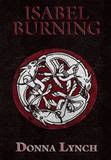 Raw Dog Screaming Press / August 2008
Raw Dog Screaming Press / August 2008
Reviewed by: Martel Sardina
Isabel Burning was not originally intended to be a novel. Author Donna Lynch, a singer/songwriter for the band Ego Likeness, had not delved into novel writing before, preferring to pen more poetry than prose. She doesn’t quite recall the sequence of events that led to the idea’s evolution, which eventually grew to include several songs on the album “Water to the Dead” and the novel, Isabel Burning. But she’ll proudly lay her claim to the final products born out of two very different types of media.
Isabel, Lynch’s protagonist, is a young English woman who is generally dissatisfied with life. She yearns to do something important, to be part of something bigger than the mediocrity she was born into, to leave her mark on the world. These longings lead her to take a job as a housekeeper for the Grace Mansion. The desire to perform domestic duties is not the reason she takes the job. Her new employer, Dr. Edward Grace, is an eccentric scientist who claims to have found a method to quantify the existence of the human soul. Isabel is fascinated by the man and his work and wants to help him in his quest.
It becomes clear that Dr. Grace has more than a professional interest in Isabel, despite being old enough to be her father. The two become lovers. As Isabel falls in love with him, she wants to know more; however, Dr. Grace is full of secrets and wants nothing revealed. Instead, he distracts Isabel with the experiment, convincing her to sacrifice her own body for the sake of the research. Grace is giving Isabel the opportunity to give her life meaning and purpose.
As the experiment continues, Isabel learns that Grace is addicted to morphine. Her participation also leads to using the drug. Isabel begins to have doubts about the validity of Grace’s theories. Could she just be subjecting herself to the crazed ideas of a madman? She doubts his vision until the night when the first round of testing is completed and she experiences things for herself that Grace has claimed to see.
This round of testing results in a shared consciousness. They have the ability to hear each other’s thoughts, although Isabel’s skill at filtering them out is not as good as Edward’s. He is still able to guard his secrets from her. Undaunted, Isabel desperately searches for the truth and stops at nothing to find it.
Lynch’s style of writing is decidedly more literary. The story is told at a rather slower pace than this reviewer is used to. Much time is spent on Isabel’s observations and feeling about events as they unfold, as opposed to a more action-oriented plot. Once the concept of the shared consciousness is introduced, there seems to be some inconsistency in how it is applied. At times, Isabel worries about Grace’s ability to hear her thoughts; other times, she takes action without regard for what Grace might do in response. Overall, the concept of quantifying the existence of the soul and the methods for doing so are interesting. Lynch’s ability to layer the story by sharing Dr. Grace’s experiences in Africa added additional elements that set the tale apart from others like it.
And for those who enjoy Isabel Burning, word on the street is that Lynch has plans to follow up with more tales of the Grace family in the future.
Purchase Isabel Burning by Donna Lynch.